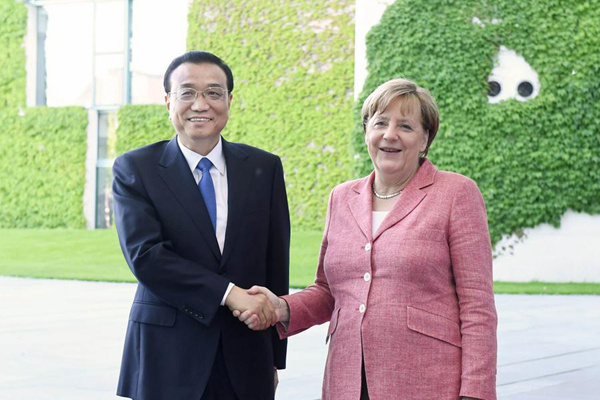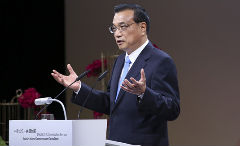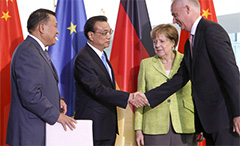Premier Li’s German trip further consolidates bilateral ties
2017-06-02
Xinhua
 Premier Li Keqiang (L) attends a welcome ceremony held by German Chancellor Angela Merkel before an annual meeting between the heads of the two countries’ governments in Berlin, Germany, May 31, 2017.[Photo/Xinhua]
Premier Li Keqiang (L) attends a welcome ceremony held by German Chancellor Angela Merkel before an annual meeting between the heads of the two countries’ governments in Berlin, Germany, May 31, 2017.[Photo/Xinhua]
BERLIN — Premier Li Keqiang wrapped up his fruitful official visit to Germany on June 1, with the two countries reaching broad consensus over a series of regional and global issues and pledging to jointly promote and enrich bilateral cooperation.
During the two-day stay, Premier Li and his German counterpart Angela Merkel conducted effective and fruitful discussions and witnessed the signing of a host of cooperative documents, which will further consolidate ties between the two countries.
Broad consensus on trade, investment liberalization
At the annual meeting between the two heads of government, a mechanism launched in 2004, Premier Li called for joint efforts with Germany to promote trade liberalization and investment facilitation.
In face of global uncertainties, anti-globalization sentiment and rising protectionism in the world, China and Germany should continue to promote trade liberalization and investment facilitation and safeguard the regulations of the World Trade Organization, Premier Li told Merkel on May 31 in Berlin.
The Premier said China hopes the two countries could work together to offset global uncertainties with a stable bilateral relationship, so as to send positive signals to the world that China and Germany will maintain the course of trade liberalization and investment facilitation.
For her part, Merkel said Germany is willing to work with China to make joint contributions to the building of an open global economy as well as the maintenance of free trade.
On June 1, Premier Li and Merkel made an announcement in a joint news conference that the two countries have agreed to speed up negotiations on an investment agreement between China and the European Union.
The investment deal will benefit the two-way opening-up and equality between the Chinese and EU markets, and improve the mutual trade and investment scales of the two sides.
As major trading partners for each other, it is necessary for China and the EU to discuss the feasibility of the establishment of a free-trade zone, Premier Li urged.
Germany attaches great attention to the EU-China investment treaty, Merkel said, adding that the signing of the treaty will be a good start of negotiations on an EU-China free trade agreement.
Forging closer innovation partnership
In 2014, China and Germany launched a joint action plan themed “shaping innovation together,” which set a precedent for science and technology cooperation between major countries.
During the past three years, solid steps have been taken in bilateral innovation cooperation, namely the alignment between “Made in China 2025” plan and Germany’s “Industry 4.0” concept, the successful cooperation model of the Research Funding 2+2, and the rapid development of various China-Germany industrial parks.
Unveiled in May 2015, the “Made in China 2025” plan helps transform China from a manufacturing giant into an innovation-motivated manufacturer.
While Industry 4.0, a concept coined by the German federal government in 2011, aims to facilitate automation and data exchange in manufacturing technologies, including cyber-physical systems, the internet of Things and cloud computing.
Addressing a bilateral forum on innovation cooperation, which is also attended by Merkel, Premier Li said China is ready to forge a closer innovative partnership with Germany.
Calling China and Germany a golden pair of innovation cooperation, the Premier said such a partnership has put a high-powered engine to China-Germany pragmatic cooperation.
He suggested that the bilateral innovation cooperation should be market-oriented and encourage the two sides to explore new models for commercial development.
He also encouraged innovation by small- and medium-sized enterprises (SMEs) and suggested the establishment of a governmental-level mechanism to serve the cooperation between SMEs of the two countries.
His speech was echoed by Merkel, who told the forum that Germany is ready to work with China to build a platform to synergize the innovation and high-tech development strategies of the two countries.
She agreed with Premier Li that the two countries should encourage mutually beneficial cooperation between big and small business, deepen cooperation between higher education and vocational education, and expand social involvement of Germany-China partnership of innovation.
Ahead of the forum, Premier Li and Merkel witnessed the signing of a series of cooperative documents in various fields, such as economy and trade, new-energy vehicles, trilateral cooperation, finance and artificial intelligence.
Resolution to tackle climate change
China once again showed the world its firm resolution to deal with climate change, as Premier Li stressed in the news conference that China will continue to work “steadfastly” to implement the commitment of the Paris climate deal.
China, a large developing country, should shoulder its international responsibilities to jointly address the challenge of climate change with other countries, he said.
Combating climate change is a global consensus, he said, adding that “with tremendous efforts, China will move toward the 2030 goal step-by-step steadfastly.”
China has actively participated in promoting and the signing of the Paris Agreement. In addition, it was also one of the first countries to submit the file of national plan on dealing with climate change to the United Nations.
Premier Li stressed that China will make more efforts to maintain the green, low-carbon and sustainable development course.
The Paris Agreement was adopted by 196 parties in 2015 and it went into effect in November last year. The pact sets a target of holding the global average rise in temperature below 2 degrees Celsius above preindustrial levels, and preferably below 1.5 degree Celsius.
So far, 147 parties representing more than 82 percent of greenhouse gas emissions have ratified the agreement.



